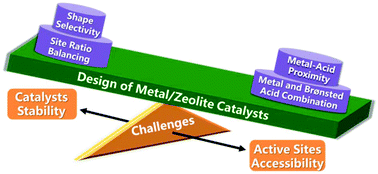Zeolite-supported metal catalysts for selective hydrodeoxygenation of biomass-derived platform molecules†
Abstract
Increasing demand for renewable chemicals and fuels has stimulated the search for alternative feedstocks and is driving the ongoing transition to a more renewables-based society. Considerable academic efforts have been directed at the valorisation of biomass sources and derived intermediates, so called platform molecules, to produce value-added chemicals and fuels. In this contribution, opportunities are discussed for the application of zeolite-supported bifunctional catalysts in the conversion of biomass sources into chemicals and fuels via hydrodeoxygenation (HDO). Such metal/zeolite catalyst systems play a prominent role in many of these biomass HDO routes. Emphasis is put on the current progress in metal/zeolite-catalysed HDO of three selected, promising routes involving biomass-derived platform molecules and the model compounds that mimic more complex feeds. Four key concepts of metal/zeolite catalysts, such as combining metal and Brønsted acid sites, site-ratio balancing, proximity between metal and acid functions and shape selectivity are discussed in order to provide a comprehensive overview. In addition, two challenges related to the accessibility of the active sites and catalyst stability in the liquid phase, typically a hot, highly polar, and protic reaction medium, are discussed. Finally, the open challenges and perspectives regarding the development of metal/zeolite catalysts for biomass HDO reactions are examined.



 Please wait while we load your content...
Please wait while we load your content...